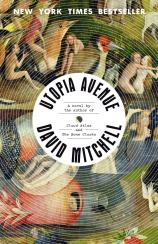Utopia Avenue
Review
Utopia Avenue
Late in his fine new novel, UTOPIA AVENUE, David Mitchell quotes the famous jazz bassist Charles Mingus’ warning that “writing about music is like dancing about architecture.” It’s an apt summary of the ambitious task he’s set for himself in this saga of the brief, tumultuous history of a British rock band at the dawn of the era of rock and roll ushered in by the Beatles in the 1960s. And it’s a credit to Mitchell that the story of this fictional quartet is so vivid and engaging that at times you might find yourself wishing you could turn to your favorite music-streaming app to dive into its oeuvre.
UTOPIA AVENUE follows the eponymous band from its creation in 1967 to its tragic demise barely a year later. The brainchild of Levon Frankland, a gay Canadian-born promoter (at a time when homosexuality had just been decriminalized in Great Britain), the group unites bassist Dean Moss, drummer Peter “Griff” Griffin, lead guitarist Jasper de Zoet, and keyboardist and lead vocalist Elf Holloway, its sole woman, all in their mid-20s. As one fan magazine describes it, the band crosses an “Angry Young Bassist, a folk-scene doyenne, a Stratocaster demigod and a jazz drummer,” a group one character refers to as “the Anti-Monkees,” and whose category-defying first album blends, in the assessment of another, “acid rock, folk with acid effects, R&B, folk interludes, passages of jazz.”
For a novel that weighs in at nearly 600 pages, Mitchell does an admirable job of maintaining the plot’s momentum (picture a highly literate version of VH1’s “Behind the Music”), as he traces the band’s journey from obscurity to success --- a path that’s marked by long drives to distant venues in a dilapidated van they nickname “the Beast,” the members’ love relationships (including a dangerous affair and a paternity lawsuit), a devastating accident, an arrest that catapults the group into the international spotlight, and enough glimpses of its internal creative workings and business struggles to give his work the feel of truth.
"David Mitchell’s spirited novel is a time machine that vaults us back to an era when it felt like music truly mattered, and a generation raised on that music was inspired by it in the search for answers to life’s questions."
Mitchell’s accounts of the band’s performances are knowledgeable and energetic, informed by guitar and piano lessons he took while writing the novel. But if you’re truly lusting after a taste of something that will at least evoke its music, you can discover for yourself the next best thing: a Spotify playlist of 67 songs he has compiled from the era.
Whether he’s describing London’s quiet streets on a foggy Sunday morning or a fetid cell in a Rome prison, Mitchell is a close observer and an assured writer. His prose is both fluid and pulsing with the same vibrancy as the music he describes. With the exception of Griff, the taciturn jazz drummer, he creates fully rounded portraits of the band’s members, rather than caricatures bolted together like erector sets from rock-music archetypes.
Mitchell stumbles only briefly when he veers off into a subplot involving Jasper’s battle with schizophrenia. As a teenager at a British boarding school, the guitarist began to experience an auditory hallucination he came to refer to as “Knock Knock” that landed him in a psychiatric institution for two years. When a recurrence of those delusions threatens to plunge him into full-fledged madness and jeopardize the band’s burgeoning success, the novel wanders into territory that’s awash with terms like “psychoesoterica” and the “Horologists” that will sound familiar to readers of Mitchell’s sometimes maddeningly obscure novel, THE BONE CLOCKS.
In a similar vein, anyone who has dutifully followed Mitchell’s career and his desire to create what he has called an “übernovel,” which links characters and plots across his fiction, will delight in allusions to previous works that include (in addition to THE BONE CLOCKS) THE CLOUD ATLAS and THE THOUSAND AUTUMNS OF JACOB DE ZOET (and yes, it’s the same family). But those unfamiliar with these Easter eggs can take a trip down UTOPIA AVENUE without fear that they’ll be missing out on any inside jokes.
Mitchell also seasons the story with enough appearances by well-known rock stars from the era to fill a good-sized wing in the Rock and Roll Hall of Fame, as he follows the band from London to New York, Los Angeles’s Laurel Canyon and San Francisco. Most of these encounters --- like the ones with The Who’s drummer Keith Moon or Jimi Hendrix --- are mere cameos, but Mitchell lingers a little longer with Leonard Cohen at the Chelsea Hotel in 1968 and Jerry Garcia, who describes how creative types like the Grateful Dead “let loose the genies,” and in “the ears of the young, they whisper what was unsayable.” Anyone reading his concluding admonition will find it echoed eerily in today’s headlines: “In the short run, not a lot seems to change. Those kids are nowhere near the levers of power. Not yet. But in the long run? Those whispers are the blueprints of the future.”
But unlike these “kids,” much of the audience for UTOPIA AVENUE will remember Don McLean’s hit, “American Pie,” from roughly the same era, and its haunting questions: “Do you believe in rock and roll? / Can music save your mortal soul?” In a lovely image, Jasper de Zoet thinks of songs like “dandelion seeds, billowing across space and time. Who knows where they’ll land? Or what they’ll bring?” David Mitchell’s spirited novel is a time machine that vaults us back to an era when it felt like music truly mattered, and a generation raised on that music was inspired by it in the search for answers to life’s questions.
Reviewed by Harvey Freedenberg on July 24, 2020
Utopia Avenue
- Publication Date: May 4, 2021
- Genres: Dystopian, Fiction, Science Fiction
- Paperback: 592 pages
- Publisher: Random House Trade Paperbacks
- ISBN-10: 0812987217
- ISBN-13: 9780812987218




